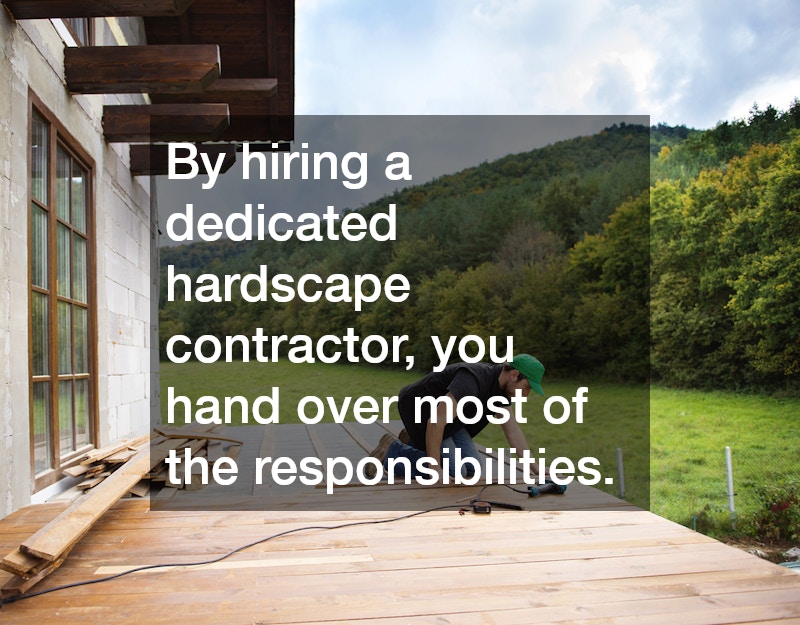When embarking on a significant outdoor renovation, such as installing a patio, retaining wall, or a custom walkway, many homeowners initially consider the do-it-yourself (DIY) route to save money. After all, how hard can stacking stones or laying pavers really be? The truth is, hardscaping is a highly specialized skill that involves much more than aesthetics. It deals with fundamental elements like drainage, soil composition, engineering principles, and long-term durability. While the initial appeal of a DIY project might be cost savings, the hidden expenses and inevitable headaches down the line often make that initial “deal” the most expensive mistake you can make.
Avoid Costly Mistakes and Rework
One of the biggest financial traps in DIY hardscaping is rework. A seemingly simple mistake in the sub-base preparation for a paver patio can lead to settling, cracking, and eventual complete failure within a year or two. Without professional experience, it’s nearly impossible to accurately gauge proper soil compaction, calculate drainage slopes, and ensure structural integrity. When a DIY patio starts to heave or flood, the cost to tear out the failed work, dispose of the materials, and then hire a professional to start over often far exceeds what the initial contractor fee would have been.
A professional hardscape contractor understands the local climate, soil types, and building codes. They have the specialized equipment, such as plate compactors and laser levels, to ensure the foundation is flawless. They get it right the first time, saving you the staggering cost of having to rebuild the project later. Furthermore, contractors have established relationships with suppliers, often accessing materials at wholesale prices that are unavailable to the average consumer, further reducing the overall material cost of the project. This efficiency and expertise translate directly into savings for you.
Save Time and Expedite Completion
Time is a valuable resource, and hardscaping projects are notoriously time-consuming. Laying a complex pattern of pavers, building a robust retaining wall, or installing intricate outdoor lighting is not a weekend project; it can easily stretch into weeks or even months for an amateur. Every day the project drags on is a day your yard is a construction zone, interrupting your enjoyment of your home.
When you hire a contractor, you are paying for their efficiency and project management skills. They have a trained crew dedicated solely to your project, allowing them to work faster and more safely than you ever could alone. They handle all the logistics: ordering materials, scheduling deliveries, managing specialized equipment rentals, and coordinating utility marking (like 811 calls). This level of organization ensures the project stays on track and is completed in a fraction of the time, allowing you to enjoy your new outdoor space sooner and eliminating the prolonged stress of managing a massive, ongoing construction site in your yard.
Ensure Quality and Access Warranties
The value of professional craftsmanship extends far beyond just a good-looking finished product; it guarantees a durable one. A reputable hardscape company uses industrial-grade materials and follows industry-best practices for installation, ensuring your investment will withstand the test of time, weather, and heavy use. They know which sealants to use for stone types, how to properly integrate steps and risers, and how to grade the land to ensure water flows away from your home’s foundation.
A critical, often overlooked, benefit of using a professional is the warranty. Most established hardscape contractors provide a warranty on their labor, often lasting several years, in addition to the manufacturer’s warranty on the materials they use. This is your insurance policy. If a paver shifts, a step cracks, or a joint material fails prematurely, the contractor will return and fix it at no cost to you. If you DIY the project, you are the warranty—and the one who has to spend a frustrating weekend fixing your own mistakes.
Eliminate Project Management and Physical Stress
The stress of a major renovation is real, and it’s multiplied when you are the sole project manager, labor, and quality control. Hardscaping involves heavy, back-breaking physical labor, including moving tons of gravel, sand, and stone. It also requires navigating complex administrative tasks, such as obtaining permits and ensuring compliance with local HOA or municipal regulations.
By hiring a dedicated hardscape contractor, you hand over all these responsibilities. You relieve yourself of the physical toll of digging and hauling, the mental strain of budget tracking and logistical coordination, and the anxiety of regulatory compliance. The contractor acts as your single point of contact, managing the entire process from initial design to final cleanup. Your only job is to approve the design and then relax while a team of experts handles the difficult work, ensuring a smooth, stress-free experience for you.
While the allure of saving a few dollars by tackling a hardscaping project yourself is understandable, the reality often leads to significant hidden costs: rework, wasted time, structural failure, and immense personal stress.

